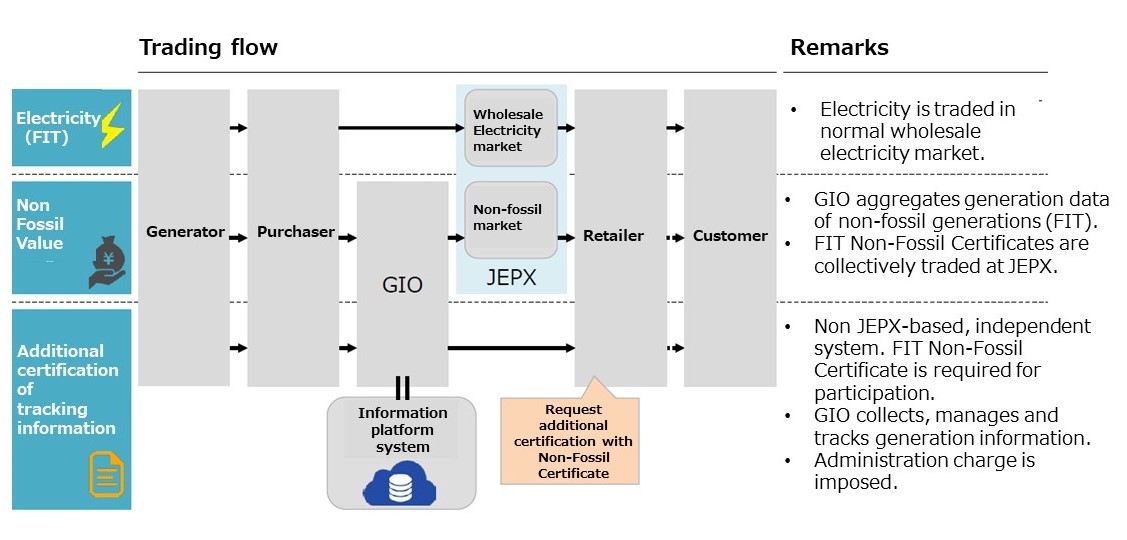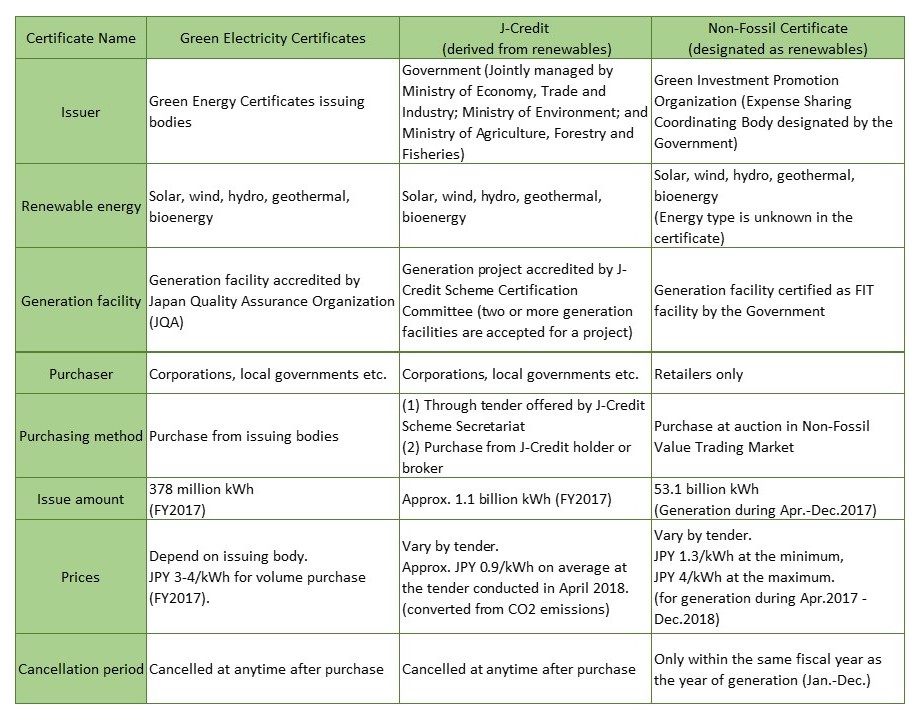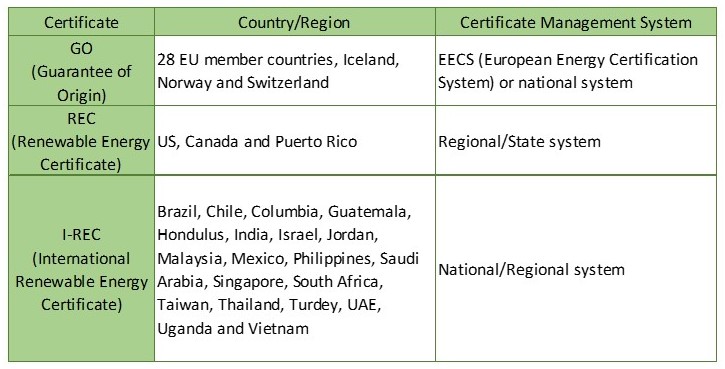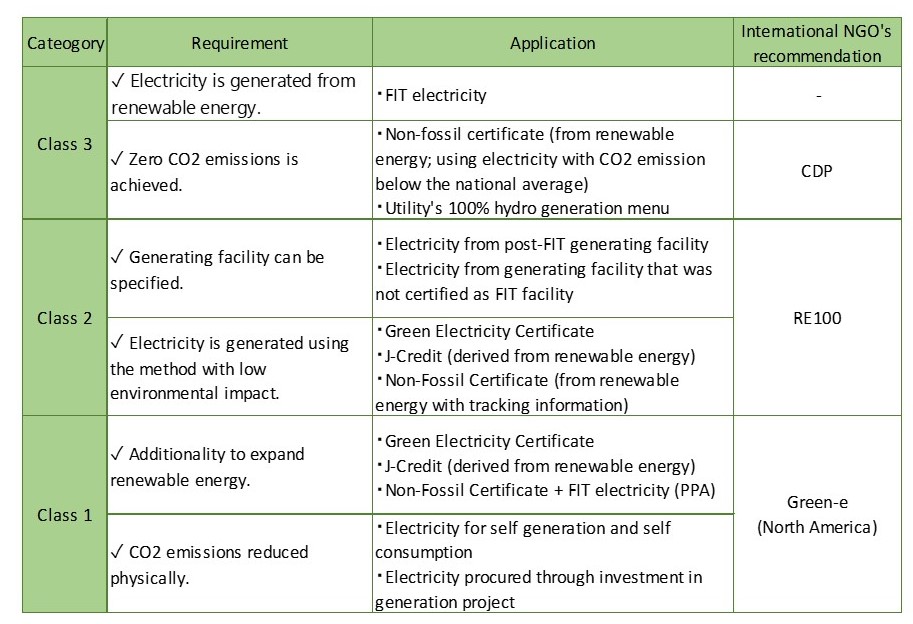Original Japanese published on 19 Dec 2018
RE100, a global initiative of over 150 member companies worldwide, has decided to approve electricity accompanied by Japan’s Non-Fossil Certificate as renewable with the condition that the tracking information is added to the certificate. The Ministry of Economy, Trade and Industry (METI) is planning a demonstration experiment to add tracking information to non-fossil certificates to be auctioned in February 2019. The certificate having tracking information will be complied with RE100. Non-Fossil Certificate will thus become more useful for the RE100 members and other companies. There remain, however, areas to be improved, in terms of the compliance with international standards.
“FIT Non-Fossil Certificate” with Tracking Information Increases Options to Procure Renewable Energy
The environmental value of renewable electricity (minimal environmental impact, zero CO2 emissions, etc.) is being traded as a certificate around the world. In Japan, there are three types of certificates: J-Credit (derived from renewable energy), Green Electricity Certificates and Non-Fossil Certificates, of which J-Credit and Green Electricity Certificates are acknowledged by major international initiatives on climate change (Figure 1).

GHG: GreenHouse Gas SBT: Science Based Targets
Source: Mizuho Information & Research Institute, “International Initiatives and National Systems Concerning Climate Change Measures”
(1st review meeting on Encouraging Japanese Companies to Address International Initiatives on Climate Change, METI, October 29, 2018)
Although Non-Fossil Certificate is recognized for its environmental value of not emitting GHGs including CO2, there is no means to prove that the electricity is generated with low environmental impact. In other words, the tracking (or attribute) information of generator is lacking. Tracking information refers to the generator’s name, location, output volume, period of generation, etc. that shows the electricity is produced by facility with minimal environmental impact. Those who purchase the certificate cannot assess the environmental impact without tracking information. At RE100 promoting use of environmentally friendly renewable energy, Non-Fossil Certificate without tracking information is not recommended because it does not comply with the requirement. Trading of Non-Fossil Certificates started in May 2018 for electricity under the Feed-in-Tariff (FIT) but has been slow due to lack of the RE100 recommendation.
METI plans to conduct a demonstration experiment in February 2019 to issue FIT Non-Fossil Certificate (Non-Fossil Certificate for electricity under FIT scheme) accompanied by tracking information to electricity retailers applied for the experiment (Figure 2). Electricity retailers are required to specify the plant(s) for which they need the tracking information by reaching agreement with the generator prior to the application. Without agreement, they may not be able to obtain tracking information of the intended plant.

GIO: Green Investment Promotion Organization; JEPX: Japan Electric Power Exchange
Source: METI, "Direction for Increasing Value of Non-Fossil Value Trading Market"
(Working Group on System Study, Electricity and Gas Industry Subcommittee, Electricity and Gas Industry Committee, 25th Advisory Committee for Natural Resources and Energy; October 22, 2018)
Since electricity labeled with the Non-Fossil Certificate carrying tracking information of generation facility has become acknowledged to be compliant with RE100, RE100 member companies have become able to utilize the certificate to achieve their 100% goal. Users are deemed to have used renewable energy if they purchase electricity with Non-Fossil Certificate with tracking information. In Japan, the procurement methods and volume of renewable energy is still quite limited. By utilizing Non-Fossil Certificate issued in large volume, companies are able to procure more renewable electricity. (Table 1)

Drastic Review Required for Certification System not Meeting International Standards
There remain, however, issues related to Non-Fossil Certificates. Much needs to be improved when comparing with renewable energy certificates issued in foreign countries.
First, the certificates overseas have a fundamental requirement to include tracking information of generation facility, therefore every certificate carries such information. In order for Non-Fossil Certificate to be recognized as a renewable energy certificate worldwide, it must be issued with tracking information from the outset. In addition, it is desirable that a system to track all attributes from certificate issuer to purchaser is established to allow power generators, retailers and users to trade renewable electricity on a fair basis. Such a management system for certificates that meet international requirements is used by a number of countries in the world (Table 2). Japan needs to follow as soon as possible.

Second issue lies in the system itself. RE100 aims at establishing environment for companies to procure renewable energy easily and at reasonably low cost. The Non-Fossil Certificate is sold at auction and the revenue is not returned to generators. In many countries, because the certificate issuer and purchaser can trade via a specific system the price of certificate typically falls with the increase of renewable energy share. Generators are still be able to increase their revenue by the sale of certificates to secure fund for investment in a new generation project. Such “additionality” of increasing renewable energy will reduce the consumption of fossil fuels and mitigate climate change. The additionality will be an essential factor for companies to procure renewable energy.
On the other hand, auction of FIT Non-Fossil Certificate sets the minimum bid price (JPY 1.3/kWh for FY2018), allowing participants to trade the certificates only above a certain price. Therefore, it cannot be an option for companies to procure renewable electricity at affordable price and in large volume. The revenue of FIT Non-Fossil Certificates is used to reduce FIT surcharges and the additionality of increasing renewable energy cannot be expected. At present RE100 does not require additionality for the member companies. However, it considers the additionality as an important aspect of renewable energy and may include it in the requirements in the future. The Green-e, which is now established as a renewable electricity label in North America, has specified the additionality as a requirement. (Table 3)

The original purpose of Non-Fossil Certificate was to increase the share of non-fossil electricity supplied by retailers rather than to promote use of renewable energy. From FY2020, the government will add Non-Fossil Certificate by electricity generated from nuclear plants. This, however, is controversial as a certificate of electricity with low environment impact. Same as in other countries, it should be issued as the Renewable Energy Certificate excluding nuclear power. The system itself needs to be drastically reviewed.
<Related Links>
Renewable Electricity Procurement Guidebook
for Corporations and Local Governments
(Digest Edition, 10 April 2019)






